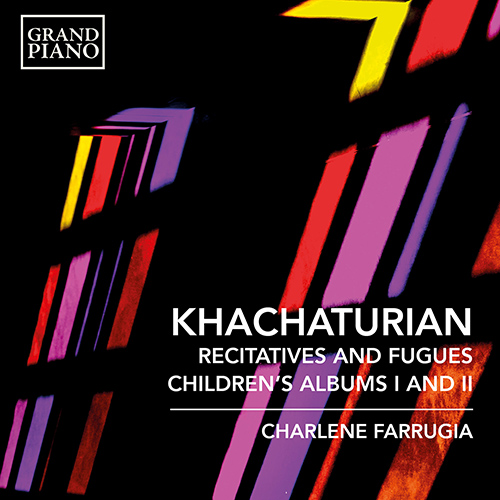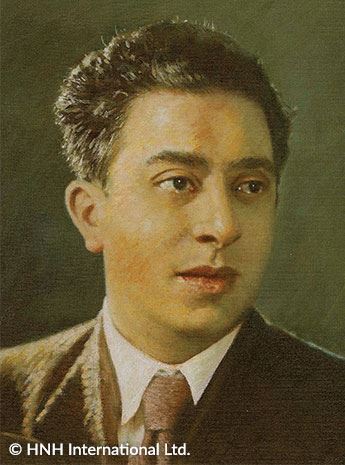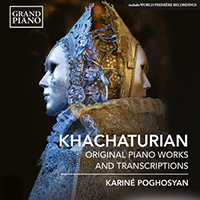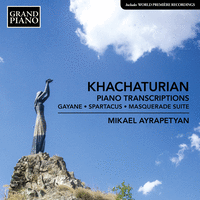
About this Release
“Music is a physical, mental and spiritual process in which we try to convey a composer's thoughts, transcending personal ego through basing our interpretation on the text before us. I feel very fortunate to have met and collaborated with the producer Ateş Orga, a writer of vast musical knowledge and deep analytical spirit. During one of our many chats, I discovered Aram Khachaturian’s largely unknown Seven Recitatives and Fugues, written in 1928–29 and revised in the late 1960s. Studying them, I was very surprised to discover there were no readily available commercial recordings – at which point I took it upon myself to come to London and repair the omission. The sixth Fugue particularly attracts me – one of the most complex and profound pieces in the collection. My choice of Khachaturian’s Children’s Albums 1 and 2 followed naturally since they harmonise beautifully in the overall mix. There's great melodic music here, from intimacy and folk impressions to imposing statement and majestic polyphony.” — Charlene Farrugia
KHACHATURIAN, ARAM IL’YICH (1903–1978)
Recitatives and Fugues • Children’s Albums I and II
- Charlene Farrugia, piano
Aram Il’yich Khachaturian was considered the ‘mouthpiece of the entire Soviet Orient’ and remains the most renowned of 20th-century Armenian composers. His unmistakable style came with an urge to invent new forms that reconciled Western practice with Eastern idiom. His ‘apprentice’ Fugues were revised and enriched with Recitatives that conjure the colourful voices of Khachaturian’s childhood in Tbilisi. Refreshingly original, amusing and provocative, the Children’s Albums belong to a tradition that reaches back to Bach, Schumann and Tchaikovsky.
This recording was made on: Steinway, Model D, number 501630
Tracklist
|
7 Recitatives and Fugues (1966) (00:25:00 )
|
|
1
Recitative No. 1: Allegro, ma non troppo (00:02:37)
|
|
2
Fugue No. 1: Moderato (00:02:44)
|
|
3
Recitative No. 2: Moderato (00:02:13)
|
|
4
Fugue No. 2: Allegro giocoso (00:01:36)
|
|
5
Recitative No. 3: Allegro giocoso (00:01:12)
|
|
6
Fugue No. 3: Adagio (00:04:35)
|
|
7
Recitative No. 4: Allegro vivace (00:01:52)
|
|
8
Fugue No. 4: Allegro non troppo (00:02:25)
|
|
9
Recitative No. 5: Allegro non troppo (00:01:19)
|
|
10
Fugue No. 5: Allegro moderato (00:01:56)
|
|
11
Recitative No. 6: Allegro poco sostenuto (00:01:43)
|
|
12
Fugue No. 6: Andante sostenuto (00:04:41)
|
|
13
Recitative No. 7: Allegro non troppo (00:01:16)
|
|
14
Fugue No. 7: Allegro marcato (00:01:26)
|
|
Children's Album, Book 1, "Pictures of Childhood" (1947) (00:18:00 )
|
|
15
No. 1. Andantino (00:01:36)
|
|
16
No. 2. No Walk Today (00:01:22)
|
|
17
No. 3. Lyado is Seriously Ill (00:02:27)
|
|
18
No. 4. Birthday (00:01:51)
|
|
19
No. 5. Study (00:01:27)
|
|
20
No. 6. Musical Picture (00:01:53)
|
|
21
No. 7. Cavalry (00:01:07)
|
|
22
No. 8. Invention (00:03:47)
|
|
23
No. 9. In Folk-Style (00:01:57)
|
|
24
No. 10. Fugue (00:01:55)
|
|
Children's Album, Book 2, "Sounds of Childhood" (1965) (00:16:00 )
|
|
25
No. 1. Rope Jumping (00:00:36)
|
|
26
No. 2. Good-Night Story (00:01:22)
|
|
27
No. 3. Eastern Dance (00:01:09)
|
|
28
No. 4. The Leopard on the Swing (00:01:13)
|
|
29
No. 5. Tambourine (00:01:22)
|
|
30
No. 6. Two Chattering Aunties (00:01:24)
|
|
31
No. 7. Funeral March (00:03:12)
|
|
32
No. 8. Rhythmic Gymnastics (00:01:15)
|
|
33
No. 9. Toccata (00:02:35)
|
|
34
No. 10. Fugue (00:01:55)
|
The Artist(s)
 Maltese pianist Charlene Farrugia studied with Dolores Amodio and Diana Ketler at the Royal Academy of Music in London. She was subsequently mentored by Boris Petrushansky for several years. Farrugia gained her doctorate in performance under Kenneth Hamilton with a thesis on piano repertory for the left hand. In 2018 she received Malta’s International Achievement Award, and in 2020 she was made an Associate of the Royal Academy of Music in recognition of her contribution to the music profession. An ambassador of EMMA for Peace (Euro Mediterranean Music Academy), under the auspices of UNESCO, she is currently associate professor of piano at the Academy of Music of the Juraj Dobrila University in Pula, Croatia. She has toured widely, with engagements taking her throughout Europe to North America and the Far East.
Maltese pianist Charlene Farrugia studied with Dolores Amodio and Diana Ketler at the Royal Academy of Music in London. She was subsequently mentored by Boris Petrushansky for several years. Farrugia gained her doctorate in performance under Kenneth Hamilton with a thesis on piano repertory for the left hand. In 2018 she received Malta’s International Achievement Award, and in 2020 she was made an Associate of the Royal Academy of Music in recognition of her contribution to the music profession. An ambassador of EMMA for Peace (Euro Mediterranean Music Academy), under the auspices of UNESCO, she is currently associate professor of piano at the Academy of Music of the Juraj Dobrila University in Pula, Croatia. She has toured widely, with engagements taking her throughout Europe to North America and the Far East. The Composer(s)
 Although Khachaturian was a relatively late starter as a composer, the majority of his works date from the earlier half of his career. These include three symphonies (1934, 1943 and 1947), concertos for piano, violin and cello (1936, 1940 and 1946), and the ballets Gayaneh (1942) and Spartacus (1954). Thereafter his conducting and administration duties left much less time for composition, though mention ought to be made of the Concerto-Rhapsodies for violin, for cello and for piano (1961, 1963 and 1968), as well as unaccompanied sonatas for cello, violin and viola (1974–6) that marked a belated return to chamber music. He also left a number of piano works, along with numerous scores for theatre and cinema—the suites of which, along with those from his ballets, kept his name alive in the concert hall despite the absence of larger symphonic works. Not in doubt is the expressive immediacy of his music, with its sensuous yet direct melodic writing, highly resourceful orchestration and elemental rhythmic drive—resulting in a popularity equalled by very few composers of his generation.
Although Khachaturian was a relatively late starter as a composer, the majority of his works date from the earlier half of his career. These include three symphonies (1934, 1943 and 1947), concertos for piano, violin and cello (1936, 1940 and 1946), and the ballets Gayaneh (1942) and Spartacus (1954). Thereafter his conducting and administration duties left much less time for composition, though mention ought to be made of the Concerto-Rhapsodies for violin, for cello and for piano (1961, 1963 and 1968), as well as unaccompanied sonatas for cello, violin and viola (1974–6) that marked a belated return to chamber music. He also left a number of piano works, along with numerous scores for theatre and cinema—the suites of which, along with those from his ballets, kept his name alive in the concert hall despite the absence of larger symphonic works. Not in doubt is the expressive immediacy of his music, with its sensuous yet direct melodic writing, highly resourceful orchestration and elemental rhythmic drive—resulting in a popularity equalled by very few composers of his generation. Reviews
“Farrugia is a fine advocate for Khachaturian—her performances of the Recitatives and Fugues is particularly memorable.” – Classical Explorer

“The Maltese pianist Charlene Farrugia meets this interesting repertoire enrichment with the greatest transparency and clear coloring. It is as refreshing as a drink of fresh, clear spring water, the unadulterated interpretation of unadulterated music.” – Pianist (Germany)
“Farrugia lavishes attention on every little detail, making these works as musical and interesting as they could possibly be. This will be a discovery for most and is well worth hearing.” – American Record Guide
“This album, Recitatives and Fugues, Children’s Albums I and II, the debut of the Maltese pianist Charlene Farrugia, released by the Grand Piano label, puts the composer fully on the map and is therefore an absolute must in the record collection of laymen and enthusiasts.” – Cultuurpakt.be



 Grand Piano has gained a reputation for producing high quality recordings of rare keyboard gems. Dedicated to the exploration of undiscovered piano repertoire, the label specialises in complete cycles of piano works by many lesser-known composers, whose output might otherwise have remained unknown and unrecorded.
Grand Piano has gained a reputation for producing high quality recordings of rare keyboard gems. Dedicated to the exploration of undiscovered piano repertoire, the label specialises in complete cycles of piano works by many lesser-known composers, whose output might otherwise have remained unknown and unrecorded.






